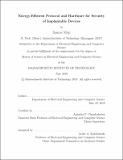Energy-efficient protocol and hardware for security of implantable devices
Author(s)
Maji, Saurav.
Download1124925617-MIT.pdf (3.012Mb)
Other Contributors
Massachusetts Institute of Technology. Department of Electrical Engineering and Computer Science.
Advisor
Anantha P. Chandrakasan.
Terms of use
Metadata
Show full item recordAbstract
Modern-day bio-electronics has truly revolutionized monitoring, diagnosis, and treatment of disease. The continued development of microelectronic has fueled the development of implantable and wearable devices by enabling them with increased functionality and features. According to the report, global active implantable medical devices (IMDs) market was valued at approximately USD 16.47 billion in 2017 and is expected to generate revenue of around USD 23.33 billion by the end of 2024 [63]. However, the deployment of these devices is limited by their security concerns. Several attacks have been demonstrated on IMDs by exploiting their weaknesses [29, 36, 38, 58, 72]. Although these attacks have been demonstrated for academic investigation, these are enough to confirm that the security of these systems needs to be addressed more aggressively. In this work, we analyze the security concerns in the design of the IMDs and the interactions with the other parties involved. Based on this analysis, we propose a protocol to address some of the shortcomings. Our protocol features a dual-factor authentication system in the IMD that relies on both cryptographic security as well as voluntary human actions before responding to any request. We discuss the merits of the protocol and analyze the trade-offs involved. The proposed protocol is implemented in an energy-efficient integrated circuit-and-system solution to emulate an actual implantable device. The design decisions involved to make the system energy-efficient and to accelerate the cryptographic computation are analyzed in detail. Finally, the impact of the implemented protocol on the entire system is obtained and discussed for various use-cases.
Description
This electronic version was submitted by the student author. The certified thesis is available in the Institute Archives and Special Collections. Thesis: S.M., Massachusetts Institute of Technology, Department of Electrical Engineering and Computer Science, 2019 Cataloged from student-submitted PDF version of thesis. Includes bibliographical references (pages 77-83).
Date issued
2019Department
Massachusetts Institute of Technology. Department of Electrical Engineering and Computer SciencePublisher
Massachusetts Institute of Technology
Keywords
Electrical Engineering and Computer Science.